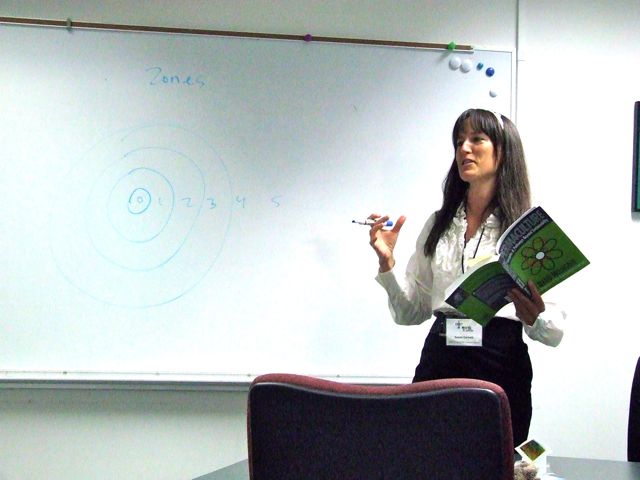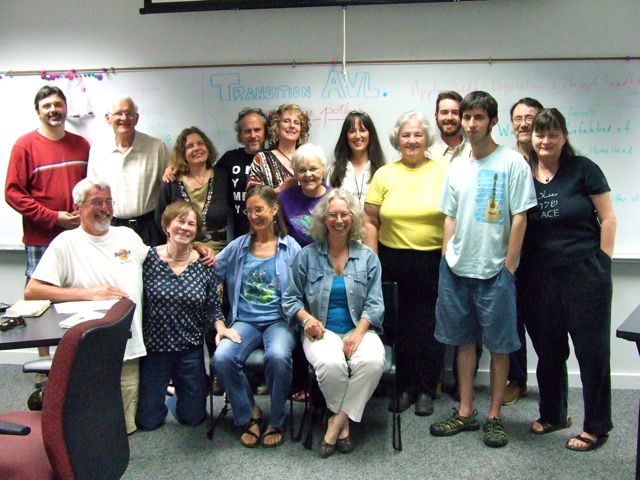A key word in the Transition Asheville movement is “resilience.” At an April 16 Transition Asheville potluck, held at Community Action Opportunities in south Asheville, Ron Martin-Adkins defined it this way: A resilient community or system is able to “continue functioning when shocks come from the outside world.”
The Transition movement identifies three major threats — Climate Change, peak oil, and global instability — and works towards addressing those threats locally. “Those [treats] are real,” said Martin-Adkins, a co-founder of Transition Asheville. The local group “works at building local resilience by building neighborhoods, building trust, [discussing ways to conserve] energy, water and food.” Martin-Adkins added that the group works to re-develop skills like gardening because “we can’t count on lettuce that comes from California.”
According to Transition Trainer and Organizer Dylan Ryals-Hamilton, “there are 458 official Transition Initiatives worldwide, and 137 of those are here in the U.S. Our local initiating group formed in the Winter 2009, and Asheville became the 88th official U.S initiative in Spring, 2011.” He continued: “We live in a world of volatile gas prices, extreme and unpredictable weather and an unstable global economy. To some the future may look bleak. We’re looking for the positive angle, designing and creating the future we want to see here in Asheville.”
Sherry Ingram, a volunteer who has worked with Transition Asheville for over three years, said that the group strives to “find local solutions to global problems.” Transition Asheville, she says, is an “outlet for me to do what I can to help the earth.”
At the group’s monthly meeting, about 20 people gathered to share a meal. After circling to give thanks and enjoying a potluck dinner, the group focused on the evening’s guest speaker, permaculture teacher Susan Garrett. She works for the Asheville Asheville-Buncombe Community Christian Ministry, is a professor at A-B Tech and has a masters degree in Strategic Leadership and Sustainability. Her presentation, titled “Apply Self-Regulation and Accept Feedback,” focused on “inner permaculture,” and discussed principles outlined by author and ecologist David Holmgren.
 (pictured: Susan Garrett; photos by Aiyanna Sezak-Blatt)
(pictured: Susan Garrett; photos by Aiyanna Sezak-Blatt)
Garrett asked the group to consider “Zone Zero” which is our personal world, beliefs, values and inner landscape. “We all have the freedom of choice,” said Garrett, “and we can decide where we place our attention.” She discussed positive and negative feedback loops, and asked the group to assess their physical, emotional, mental and spiritual patterns and choices. For example, “When I work too much, or sit for long periods of time without moving, I become stressed,” said Garrett. Stress is a signal from the body, and a warning. “A negative feedback loop begins when we ignore the signals,” she said. “Self-regulation is possible by assessing our inner-world, examining feedback, and [empowering] our chooser muscles.”
Transition Asheville potlucks take place on the third Tuesday of the month, and are open to the public. “These potlucks have been a lot of fun so far,” said Ryals-Hamilton. “The funny thing is, the presentation is just a small piece of the attraction. It’s the connections that people make with each other here, the conversations around the dinner table, that’s the most valuable part.”
For more information about the national Transition movement click here. For more about Transition Asheville and to get involved, click here.




Before you comment
The comments section is here to provide a platform for civil dialogue on the issues we face together as a local community. Xpress is committed to offering this platform for all voices, but when the tone of the discussion gets nasty or strays off topic, we believe many people choose not to participate. Xpress editors are determined to moderate comments to ensure a constructive interchange is maintained. All comments judged not to be in keeping with the spirit of civil discourse will be removed and repeat violators will be banned. See here for our terms of service. Thank you for being part of this effort to promote respectful discussion.